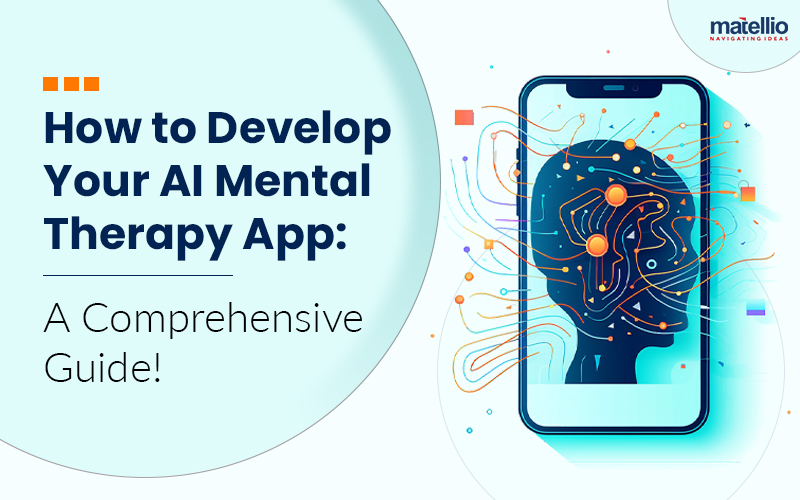How to Develop Your AI Mental Therapy App: A Comprehensive Guide!
In today’s fast-paced world, the need for mental health support has never been greater. Technological breakthroughs have made AI a potent instrument in delivering mental health therapy. Imagine having a therapist on call around the clock, ready to offer advice, counsel, and support as you navigate your mental health. An AI mental therapy app can do this.
In this blog, we’ll explain how to build your own AI mental therapy app that provides users with helpful support.
So, let’s get started!
What are AI Mental Therapy Apps?
Apps that use AI/ML to help and treat mental health issues are known as AI mental therapy apps. These applications provide users with rapid access to tools and procedures for managing stress, anxiety, depression, and other mental health disorders since they are available around the clock, unlike traditional counselling practices.
They offer individualised experiences catered to unique requirements, making treatment more practical and pertinent.
Why Must You Invest in Building an AI Mental Therapy App?
The choice to invest in building an AI mental therapy app is progressive and in line with meeting the urgent demands of today’s mental health. These are some strong reasons in favour of making such an investment:
Personalised Therapy Journeys
A tailored and successful therapy journey is ensured by an AI mental therapy app that adapts its approach to each user. These applications utilise sophisticated algorithms to assess user data and behaviour patterns and produce personalised therapy programs that address specific user requirements. This unique touch improves engagement and raises the possibility of successful outcomes.
Constantly Available Support
An AI mental treatment app offers round-the-clock help. Users can always seek advice and coping mechanisms because of this continual accessibility, which is quite beneficial. People struggling with anxiety, sadness, or other mental health issues can find solace in knowing they can always turn to a trustworthy source of help.
Privacy
Due to the stigma around mental health disorders, regular treatment can be scary for many people. The amount of anonymity provided by AI mental therapy apps can enable more individuals to seek treatment without worrying about being judged. Users can participate in private therapy from their homes, which promotes security and openness.
Reliable Progress Monitoring
In mental health journeys, tracking progress is crucial, and AI apps thrive in this area. These applications provide users insights into the development of their emotional well-being over time through data analysis. Users are inspired to continue their therapy and celebrate their accomplishments because of this visual portrayal of development.
A Participatory and Interesting Experience
The days of boring treatment sessions are over. AI mental treatment applications use interactive and exciting media, including games, quizzes, and multimedia content, to create engaging experiences. These components provide enjoyment to therapy and motivate clients to engage actively, which improves outcomes.
Budget-Friendly Option
Many people find traditional therapy out of reach due to its high cost. Apps for AI mental therapy provide a less expensive option without sacrificing effectiveness.
Global Outreach and Impact
Technology’s capacity to cross geographical borders is one of its most attractive features. With a worldwide reach, AI mental therapy applications enable people to get mental health care no matter where they are. This extensive effect has the potential to enhance millions of people’s quality of life around the world.
Continuous Learning and Improvement
Apps for AI mental health therapy are made to learn and change. As users interact with the app, data is gathered that helps guide its therapeutic approaches. Through its ongoing learning process, the app can improve its methods and offer more efficient help over time.
If you’re ready to explore the potential of AI mental therapy apps, contact us at Matellio, the leading AI software development company. In the field of mental health, we specialise in developing ground-breaking solutions. For a consultation, reach out to us right away!
Moving ahead, let’s discuss,
Top Challenges You Might Encounter in AI Mental Therapy App Development
Building an AI mental therapy software can be immensely fulfilling since it can provide those who are experiencing mental health problems accessible and individualised help. However, there can be difficulties that developers run into along the road, just as with any large-scale project. Let’s review the main obstacles you can face during therapy app development and further explore each one.
Privacy and Ethical Issues
You will unavoidably encounter challenging ethical and privacy issues as you set out to develop an AI mental therapy app. Data security and confidentiality concerns are raised when sensitive user data is collected to offer individualised treatment interventions. Users want confirmation that their private data won’t be abused or exploited.
Solution – Put strong security measures first and follow stringent data protection laws. Before collecting personal data, clear your data usage rules to consumers and get informed consent. Building trust can be facilitated by being open about how AI algorithms operate and how user data is used.
AI Algorithm Accuracy and Reliability
The precision and dependability of an AI mental treatment app’s AI algorithms are crucial to the app’s efficacy. Users’ mental health can suffer due to inaccurate assessments or suggestions, undermining their faith in the app’s skills.
Solution – Work with an expert AI development company to improve and evaluate AI algorithms. Continually improve algorithms based on user input and interactions in the real world. The precision of the app’s suggestions and replies can be enhanced by combining machine learning with human review.
Long-Term Usage and User Engagement
Keeping users interested in the app and promoting frequent use might be challenging. After a short while, many users can lose interest or stop using the software. For the app to be effective, engagement must be maintained consistently.
Solution – Keep the user experience in mind while you design the app. Include gamification, interactive aspects, and user-friendly features.
Thymia, a company in the UK, raises $2.7 million to develop its AI approach to gamifying the diagnosis of mental health issues.
Personalise the app’s content to reflect users’ unique requirements and tastes to keep them interested in using it over time.
Personalization and Cultural Sensitivity
Different people and cultures perceive and express emotions in different ways. Creating an AI mental therapy app capable of cultural sensitivity and personalisation for various users might be challenging.
Solution – Include cultural sensitivity in the app’s algorithms and design. Give people the ability to alter their experiences following their cultural preferences. Update the app’s content often to include a variety of cultural subtleties and manifestations of emotion.
Top Advanced Features of AI Mental Therapy App!
These applications’ ability to offer individualised, readily available, and practical help has completely changed how we think about mental health. Here are the top advanced features you should incorporate to build an AI mental therapy app to provide a thorough and helpful experience.
 Personalised Therapy Plans
Personalised Therapy Plans
The path to improving mental health is different for everyone. Your AI mental therapy app should provide individualised treatment programs adapted to each user’s unique requirements. Using user input and AI analysis, the app can produce unique methods that answer users’ issues.
 Real-time Mood Tracking
Real-time Mood Tracking
It’s essential to comprehend emotions for treatment to be successful. Include a real-time mood monitoring tool that lets users record their feelings and daily activities. Therapists and AI systems can use this data to find trends and provide effective solutions.
 Cognitive Behavioral Therapy (CBT) Modules
Cognitive Behavioral Therapy (CBT) Modules
CBT is a tried-and-true therapy strategy for a range of mental health issues. Incorporate interactive CBT modules that lead users through self-help activities so they can confront unhelpful thought patterns and create better coping skills.
 AI-driven Progress Insights
AI-driven Progress Insights
By showing their accomplishments, users can stay inspired and involved. AI can be used to evaluate data from a patient’s course of therapy and provide perceptive visuals that point out improvements, strengthening the patient’s commitment to the procedure.
 Virtual Support Groups
Virtual Support Groups
Connecting with people going through similar things is beneficial. Include online discussion forums where users can exchange stories, provide encouragement, and participate in conversations under the supervision of qualified moderators.
 Mindfulness and Meditation Practices
Mindfulness and Meditation Practices
Both meditation and mindfulness are effective methods for reducing stress. Offer users coached mindfulness practices that aid in developing self-awareness and a sensation of peace.
 24/7 Chatbot Assistance
24/7 Chatbot Assistance
A 24/7 AI-powered chatbot can offer quick support in times of need or when expert assistance is not easily accessible. Ensure the chatbot is prepared to deal with delicate circumstances and provide the proper resources.
 Goal Setting and Achievement
Goal Setting and Achievement
Encourage users to create attainable objectives for their journeys with mental health. They should be able to monitor their development, recognise accomplishments, and modify their goals using the app.
 Interactive Journaling
Interactive Journaling
A therapeutic technique that encourages self-reflection is journaling. Introduce an interactive journaling tool that asks users to share their ideas, feelings, and experiences to promote emotional expression and self-discovery.
 Virtual Reality (VR) Escapes
Virtual Reality (VR) Escapes
Utilising VR technology transports viewers to peaceful virtual surroundings. Short relaxation and escape from pressures that these immersive activities can give can improve general well-being.
 AI-driven Audiovisual Content
AI-driven Audiovisual Content
Personalised audiovisual material should be delivered depending on user demands and preferences. Diverse material can increase attention and address different emotional states, from peaceful nature vistas to inspirational speeches.
 Progress Sharing with Therapists
Progress Sharing with Therapists
Enabling progress sharing will help users and their therapists work together. Between sessions, therapists can learn more about their patients’ experiences, offering more individualised care.
 Crisis Intervention Protocols
Crisis Intervention Protocols
Include a straightforward process for handling emergencies. The app should offer instant assistance and put users in touch with specialists if they want to hurt themselves or others.
 Wearable Integration
Wearable Integration
Integrating your AI mental treatment software with wearable technology might increase its effect at a time when wearable technology is becoming a significant part of our lives. With Matellio’s expertise in wearable app development services, users can easily access your app’s features from their fitness trackers or smartwatches. Through this interface, users can receive ongoing assistance while on the move.
 Personalisation
Personalisation
Add machine learning algorithms that examine user interactions and modify the app’s replies as necessary. For instance, if a user responds favourably, the app should remember and accentuate specific strategies or coping mechanisms in subsequent encounters.
After exploring the top cutting-edge features to consider while creating AI mental treatment software, it is abundantly evident that these features can significantly improve user experience and results.
Consider working with a reputable healthcare app development company like Matellio if you want to design a cutting-edge mental therapy app. Matellio can assist you in realising your vision while putting user well-being first, thanks to their expertise in wearable app development services and dedication to innovation.
Steps to Develop Your AI Mental Therapy App!
An AI mental therapy app can close this gap by providing a private and judgment-free forum for users to share their ideas. But how can you develop an app that offers valuable answers besides comprehending the complexity of human emotions?
You need to take the following steps to create a robust mental therapy app: –
 Defining Your App’s Purpose
Defining Your App’s Purpose
Identify the aim and objectives of your AI mental treatment software before you start development. Find out what particular mental health disorders, such as stress, depression, or anxiety, it will treat. Its clearly stated goal will determine the app’s features and functions.
 Choosing the Right AI Technology
Choosing the Right AI Technology
It is essential to choose the right AI technology. Understanding users’ emotions and replies requires sentiment analysis and natural language processing (NLP). The significant technologies to take into account while creating an AI mental therapy app are as follows: –
- Programming Languages & Frameworks – Python, Java, Kotlin, Swift, Objective C, React Native, HTML5, CSS3, JavaScript, Node.js, Express.js
- Database – MongoDB, PostgreSQL, MySQL
- AI and Machine Learning –TensorFlow, Keras, Natural Language Processing (NLP) Toolkit
- Cloud Services – AWS, Azure, GCP
- Analytics – Google Analytics, Mixpanel
 Designing the User Interface
Designing the User Interface
An AI mental treatment app must have a clear and user-friendly UI. The layout should make it simple to access various functionalities and promote open conversation. Users should feel at ease discussing their thoughts and emotions with the app.
 Implementing Conversational Flows
Implementing Conversational Flows
Create conversational flows that are lively and interesting. Your software should carry in thoughtful discussions, pose pertinent queries, and offer wise replies. Users should feel heard and understood throughout these talks.
 Incorporating Machine Learning
Incorporating Machine Learning
The core of AI is machine learning. It enables your app to grow over time by learning from user interactions. For example, the software can track which coping strategies work best for specific users and adjust its replies appropriately.
 Ensuring Data Privacy and Security
Ensuring Data Privacy and Security
Privacy and security are indeed of the utmost importance while handling sensitive user data. Assure your users that your company will respect tight security guidelines and keep their data private. Doing this builds user trust and attracts more people to interact with your app.
 Testing and Iteration
Testing and Iteration
Test your app rigorously on users to find bugs, mistakes, or potential improvements. Frequent updates based on user input will improve the app’s performance and user happiness.
Making an AI mental therapy app is a worthwhile undertaking that has the potential to improve people’s lives significantly. Partner with a reputable mobile app development company like Matellio if you’re prepared to take the plunge and develop an app that provides comfort and assistance. Matellio can help you at every stage of the procedure, thanks to their knowledge of developing healthcare apps, AI apps, and DevOps consulting services.
Why Should Matellio Be Your Development Partner?
Working with the best healthcare app development company is essential when creating an AI mental app. Matellio, a top provider of DevOps consulting services, AI software development, and healthcare, provides the knowledge required for successful healthcare.
Pioneering Innovations in Healthcare and AI
The track record of Matellio in the development of AI and healthcare speaks for itself. Thanks to a team of qualified experts, they are prepared to realise your concept for an AI mental therapy app.
A Holistic Approach to Development
In addition to developing apps, Matellio creates holistic solutions that put the user’s needs, security, and scalability first. This all-encompassing strategy guarantees that your software satisfies the highest requirements for quality.
Empowering Your DevOps Journey
DevOps principles are crucial for the development of apps in a digital environment that is continually growing. With the help of Matellio’s DevOps consulting services, you’ll have the information and resources necessary to accelerate development, deployment, and continuous improvements.
Conclusion
There is no denying that AI development services have the potential to transform mental healthcare. You can indeed develop an app that allows users to take charge of their mental well-being while providing practical help by fusing the strength of AI technology with compassionate design. Remember that every trip of a thousand miles begins with a single step, and your decision to create an AI mental therapy app can be the one that transforms the lives of countless others.


 Personalised Therapy Plans
Personalised Therapy Plans Cognitive Behavioral Therapy (CBT) Modules
Cognitive Behavioral Therapy (CBT) Modules AI-driven Progress Insights
AI-driven Progress Insights
 Mindfulness and Meditation Practices
Mindfulness and Meditation Practices







 Personalisation
Personalisation
 Defining Your App’s Purpose
Defining Your App’s Purpose Choosing the Right AI Technology
Choosing the Right AI Technology Designing the User Interface
Designing the User Interface Implementing Conversational Flows
Implementing Conversational Flows Incorporating Machine Learning
Incorporating Machine Learning Ensuring Data Privacy and Security
Ensuring Data Privacy and Security Testing and Iteration
Testing and Iteration

